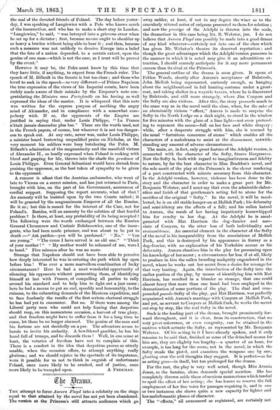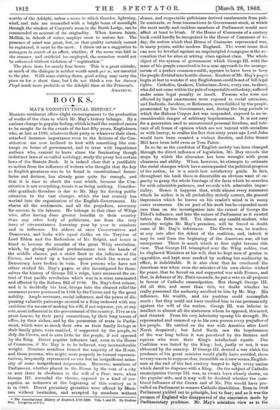gke granta.
THE attempt to force Aurora Floyd into a celebrity on the stage equal to that attained by the novel has not yet been abandoned. The version at the Princess's still attracts audiences which go away sadder, at least, if not in any degree the wiser as to the oracularly uttered series of enigmas presented to them for solution ; and now the prestige of the Adelphi is thrown into the scale, the dramatiser in this case being Al r. B. Webster, jun. I do; not believe that Aurora Floyd can possibly be made into a good drama of any kind whatever—certainly not into one of the class which has given Mr. Webster's theatre its deserved reputation ; and though the great advantages which the Adelphi version possesses in the manner in which it is acted may give it an adventitious at- traction, I should scarcely anticipate for it any more permanent success than its rival at the Princess's.
The general outline of the drama is soon given. It opens at Felden Woods, shortly after Aurora's acceptance of Bulstrode, John Mellish being represented, curiously enough, as hanging about the neighbourhood in full hunting costume under a great- coat, and taking shelter in a 'wayside tavern, -where he is discovered by Bulstrode, and still more strangely, where Jim Conyers and the Softy are also visitors. After this, the story proceeds much in the same way as in the novel until the close, when, for the sake of an abominably vicious "effect," Aurora is made to surprise the Softy in the North Lodge on a dark night, to stand in the window for five minutes with the glare of a lime light—not even pretend- ing to represent the moon—full on her face and white drapery ; while, after a desperate struggle with him, she is rescued by the usual "fortuitous concourse of atoms" which enables all the characters of a melodrama to assist at the denouement, notwith- standing any amount of adverse circumstances.
The main, or, in fact, only great feature of the Adelphi version, is connected with the character of the Softy, Steeve Hargreaves. Now the Softy is, both with regard to imaginativeness and fidelity to nature, by far the best character in Miss Braddon's novel, and the sole merit of the play at the Princess's is the clever rendering of a part constructed with minute accuracy from this character. In the Adelphi version, however, violence has been done to the story and the character in order to make a great part for Mr. Benjamin Webster, and I must say that even the admirable elabor- ation and finish of that gentleman's acting fail to atone for the sacrifice of the original "Softy." In the novel, it will be recol- lected, he is an old stable hanger-on at Mellish Park ; his deformity and semi-idiotcy are the effects of a fall; and his sullen hatred to Aurora, the result of her having impatiently horsewhipped him for cruelty to her dog. At the Adelphi he is amal- gamated with Mat Harrison the dog-fancier and asso- ciate of Conyers, to the utter loss of both individuality and vraisemblance. An essential element in the character of the Softy of the novel is his inseparability from the associations of Mellish Park, and this is destroyed by his appearance in Surrey as a dog-fancier, with no explanation of his Yorkshire accent or his deformity. Aurora chastises him in the play for presuming upon his knowledge of her secret ; a circumstance far less, if at all, likely to produce in him the sullen brooding malignity engendered in the novel, where he works out her secret from a desire for revenge for that very beating. Again, the introduction of the Softy into the earlier portion of the play, by means of identifying him with Mat Harrison, has resulted in a blunder so strange, that one could almost fancy that more than one hand had been employed in the dramatization of some portions of the play. The dual and com- pounded pseudo-Softy of the play, qua Mat Harrison, was perfectly acquainted with Aurora's marriage with Conyers at Mellish Park, and yet, as servant to Conyers at Mellish Park, he works the secret out step by step, like the real Softy in the novel.
Such is the leading part of the drama, brought prominently for- ward throughout, and it is clear, from its construction, that no very great coherence, or even congruity, can be attained in the motives which actuate the Softy, as represented by Mr. Benjamin Webster. Of his acting in it I have already spoken, and it only remains to be said that, finished as some of the detached scenes for him are, they are slightly too lengthy—a quarter of an hour, for example, is too long for the scene, not in the novel, in which the Softy steals the pistol, and examines the weapons one by one, gloating over the evil thoughts they suggest. It is perfect—as far as acting goes—in itself, but too prolonged for the drama.
For the rest, the play is very well acted, though Miss Avonia Jones, as the heroine, alone demands special mention. She has completely thrown aside those obnoxious mannerisms which tended to spoil the effect of her acting; she has learnt to reserve the full employment of her fine voice for passages requiring it, and in one or two instances she shows quite a new capacity for lighter and less melodramatic phases of character. The "effects," all announced as registered, are certainly not worthy of the Adelphi, unless a scene in which thunder, lightning, wind, and rain are reconciled with a bright beam of moonlight through the window of Conyers's room in the North Lodge, can be commended on account of its originality. When Aurora faints, Mellish, in default of water, employs snow to restore her. The presence of mind was great, but, as that quality certainly cannot be registered, it must be the snow. I throw out as a suggestion to managers in search of an effect, whether, if the scene was laid in the summer, and artificial ice employed, the sensation would not be enhanced without violation of " registration."
The piece lasts for nearly four hours. This is a great mistake, as much of the dialogue is neither worth much per se, nor essential to the plot. With some cutting down, good acting may carry the piece on for a short time, but I do not think a run for Aurora Floyd much more probable at the Adelphi than at the Princess's.
AMATEUR.































 Previous page
Previous page